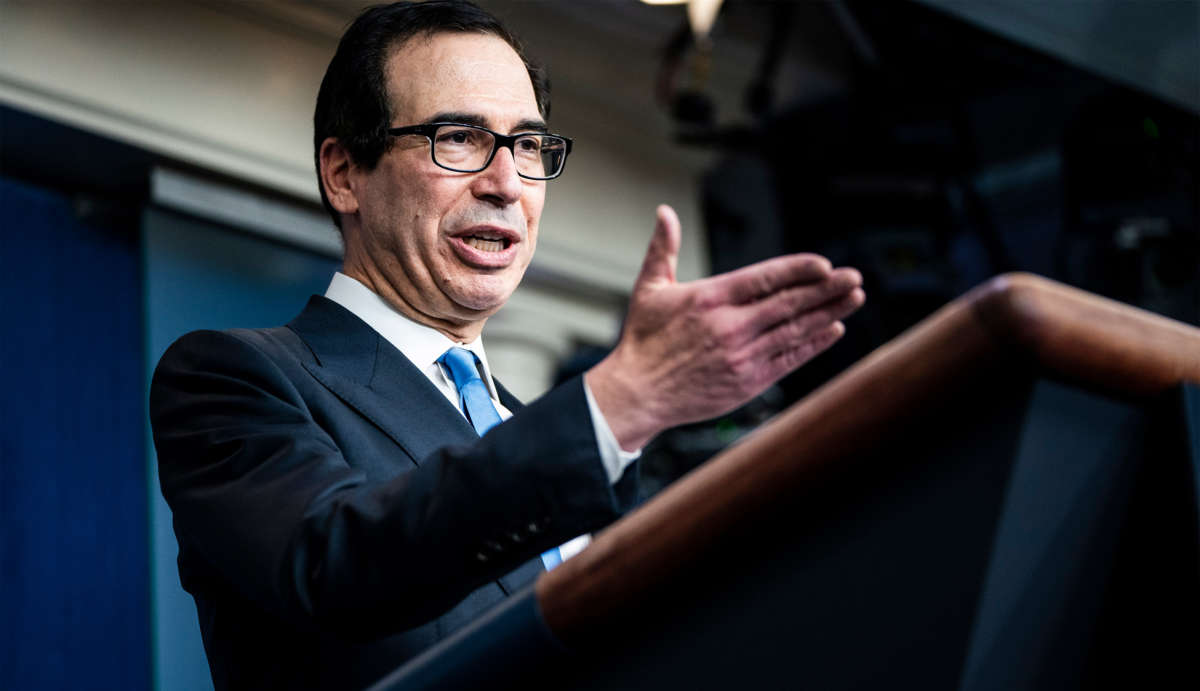United States Treasury Secretary Steve Mnuchin assured conservative lawmakers on Tuesday that unemployment benefits could not be collected by workers who refused to return to work out of fear of contracting coronavirus.
While speaking before the Senate Banking Committee, Sen. David Perdue questioned Mnuchin on whether additional aid of $600 per week in unemployment “disincentivizes” people from returning to work. It’s estimated that half the U.S. workforce could receive more income from unemployment than from their regular jobs. However, many studies in the past have also demonstrated that even generous unemployment programs don’t have much of an ill effect on keeping people from going back to their places of employment.
Nevertheless, some lawmakers remain worried that workers, fearful of contracting coronavirus, could cite those fears in order to keep collecting unemployment.
Mnuchin, who is not necessarily a friend to the working class (he was nicknamed the “Foreclosure King” during the Great Recession and benefited to the tune of millions from the Wall Street bailout of 2008), told Perdue and other members of the committee on Tuesday he was “aware of the technical problem,” but didn’t think it was something to worry over because, in his view, anyone who says they won’t return to work for those reasons would be denied unemployment insurance.
“If you offer back a worker and they don’t take that job, you will be required to notify the local unemployment insurance agency because that person will no longer be eligible for unemployment,” Mnuchin told the committee.
Such concerns by Republicans are perhaps moot points at this juncture, however, because the additional $600 per week of unemployment aid isn’t meant to last forever — per the CARES Act legislation that passed in late March, the additional funds for unemployment expire at the end of July.
There have been attempts by Democrats in the House to extend unemployment aid to workers beyond that date. But the bill passed by the House last week has little chance of getting support in the Republican-led Senate, and an even smaller possibility of being signed into law by President Donald Trump, who expressed to Republicans during a luncheon this week that he was opposed to the measure.
Americans overall are worried about returning to work amid the COVID-19 crisis. According to findings from a Washington Post/Ipsos poll published earlier this month, 58 percent of respondents said they had concerns that going to work could expose them, and in turn their loved ones at home, to the disease.
Certain individuals can continue to collect unemployment during the coronavirus pandemic, even if they are offered their jobs back. Workers with diabetes, heart disease, or immune deficiencies, fearful that going back to work will be dangerous to their health, are protected by provisions of the CARES Act. Workers who lack a way to find childcare may also be able to continue to collect unemployment.
However, a general fear of contracting the disease isn’t enough to allow workers to stay at home. Even if workers cited unsafe conditions at their places of employment, they would have to document how bad things were in order to argue that they shouldn’t have to return to work due to coronavirus concerns, a difficult and likely arduous task for an individual to go through as it involves having to make their case to the state unemployment office.
Join us in defending the truth before it’s too late
The future of independent journalism is uncertain, and the consequences of losing it are too grave to ignore. To ensure Truthout remains safe, strong, and free, we need to raise $27,000 in the next 24 hours. Every dollar raised goes directly toward the costs of producing news you can trust.
Please give what you can — because by supporting us with a tax-deductible donation, you’re not just preserving a source of news, you’re helping to safeguard what’s left of our democracy.
